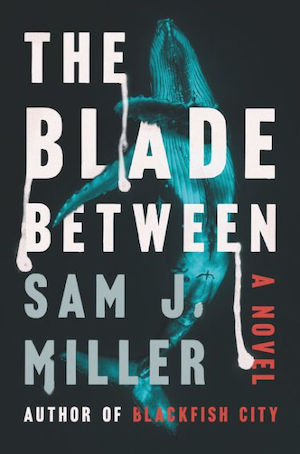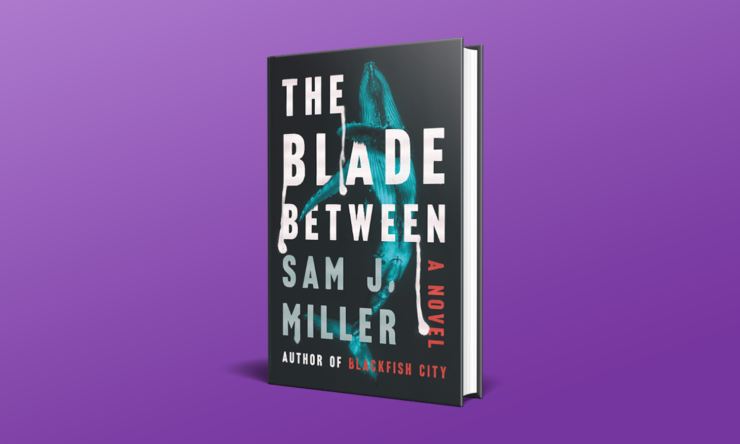Ronan Szepessy, a recently-sober gay photographer, promised himself he’d never come home to Hudson—no matter his father’s ailing health or his guilt over leaving the dying town behind. And he’s done well keeping that oath, until he wakes up on the train from New York City with no clear memories of boarding. When he arrives he realizes the city has changed: overrun with young, white, wealthy kids, antique stores and coffee bars blossoming in place of family businesses. Gentrification has forced locals from their homes and worsened fractures that have lingered under the surface for decades.
Hudson, though, has a long and gore-soaked history that throbs in the blood of its inhabitants: ghosts, nightmares, strange powers. The small gods that are the city do not take kindly to the incursion of outsiders, and neither do the real people losing their livelihoods. After Ronan reconnects with his childhood friends Dom and Attalah, now married, he and Attalah start a scheme to rescue their home—but the situation spirals out of control, and Ronan must come to terms with his own demons if he intends to stop the destruction he’s unwittingly set in motion.
The Blade Between begins with an epigraph from James Baldwin: “But it is not permissible that the authors of devastation should also be innocent. It is the innocence which constitutes the crime.” For a novel that is as much a meditation or an exorcism as it is a supernatural thriller, that opening quote sets the tone really well: we’re going to be digging into systemic and interpersonal violence, and the answers won’t be straightforward or comfortable. Gentrification is one monster gnawing on the bones of Hudson, but a bubbling destructive hate is another—one that Ronan feeds from his own unaddressed trauma.
To be frank, The Blade Between is one of the best books I’ve read in 2020. Miller’s prose is phenomenal: sometimes dripping with malice, sometimes warm with affection, sometimes quiet in solitude or misery. Seriously, it’s so good I regularly paused to luxuriate over specific lines, but it’s more than just handsome writing. Miller has crafted a mature, thoughtful, and challenging novel that tackles the problem of being ethical in the world. No one is a good or bad person, because those aren’t the measures we need to be using.
Buy the Book


The Blade Between
(Spoilers follow.)
The supernatural lifeblood of the story—small gods and magic—makes the arguments about big ideas like hope, hate, and community-building into physical realities. Working from a place of loathing rather than care, for example, manifests a monster like Tom whose goal is burning the whole town to the bedrock. Through fantastical elements, Miller offers a gripping portrait of how the personal connects to the political… via spooky ghosts, mysterious murders, and a spreading lust for destruction that springs up in people’s hearts like mushrooms after a rain once Ronan lets his pain loose.
The Blade Between handles intersectionality as a very human mess, linking regionality with poverty with race with gender with sexuality with debility, and so on. Doing what’s possible within the system available might require complicity; for example, Attalah works for social services and Dom is a police officer, which complicates their positions in the community. Ronan’s whiteness inflects his queerness which inflects the shape of his desire for success and safety, as well as his often-problematic relationships to Dom and Attalah, who are both Black. Love, after all, isn’t innocent either.
It’s not an easy read, that’s for sure. I found Ronan a harrowing protagonist to exist inside, in part because I resonated a little too powerfully with the old blade lodged between his ribs. Miller engages at intimate depths with the vibrant hate that experiencing traumatic violence, such as homophobia, can produce in survivors. Pain weaves through the lives of the characters, as other issues like opioid addiction, inaccessible healthcare, carceral oppression, racism, and homelessness abound in Hudson.
However, while The Blade Between is full of hurt people who are struggling, it’s far from grim. The observational clarity Miller brings to the page is unflinching but, somehow, kind. He gives all these characters grace without erasing their flaws. For example, the reflections on addiction and loneliness the novel works through—the role that apps like Grindr and Tinder play first in Ronan’s cruelty and later Tom’s—cut me to the quick. Familial relationships too are fraught for Ronan and Attalah, among others, though in different ways. Learning to deal with the afterlife of trauma, lest you continue the cycle, is part of the resolution of the novel as well as its thematic arc.
And on that note, I adored the fact that the story is about gentrification: as monster, as haunting, as conflict—but also as complex phenomenon based in need. Ronan’s struggle with his sympathy for the gay billionaire attempting to “revitalize” the city is relatable, because he himself barely survived the town Hudson used to be. At the same time, he hates seeing his neighbors driven out, his city rendered unrecognizable, his old friends wounded. The central conflict of The Blade Between, within its hauntings and histories, is how to bring economic life to a place that needs help—without doing more harm than good. It’s abundantly clear that Miller has had involvement with housing rights and neighborhood organizing, particularly in the conclusion.
I also resonated deeply with the novel’s refusal to accept simple answers to the problem of ‘love or hate,’ instead settling on love-as-labor. Hating is much easier than processing or doing work to support and care for one another. Accepting that means accepting that none of us are innocent, but it’s a responsibility to do better. That message as well as how powerfully Miller brings it to the reader are strengths of The Blade Between—though Ronan’s sacrifice-as-amends is an upsetting conclusion to face. The ending reads like an act of exorcism: Ronan dies, but he survives in another form. Wick also gets a long and productive afterlife, a touch of kindness that relieves some of the agony of his prior suicide.
The Blade Between deserves praise on the craft level, but also for the work being done under the surface of that technical brilliance. The meditation on the messily-human trouble of ethics pairs with a mature exploration of the weight of transformation/restoration—for people, communities, histories—in a discomfiting but vital story that throbs off of the page. I’m going to be sitting in thought with this book for awhile, and for that, I’m grateful.
The Blade Between is available now from Ecco.
Read an excerpt here.
Lee Mandelo is a writer, critic, and editor whose primary fields of interest are speculative fiction and queer literature, especially when the two coincide. They have two books out, Beyond Binary: Genderqueer and Sexually Fluid Speculative Fiction and We Wuz Pushed: On Joanna Russ and Radical Truth-telling, and in the past have edited for publications like Strange Horizons Magazine. Other work has been featured in magazines such as Stone Telling, Clarkesworld, Apex, and Ideomancer.










